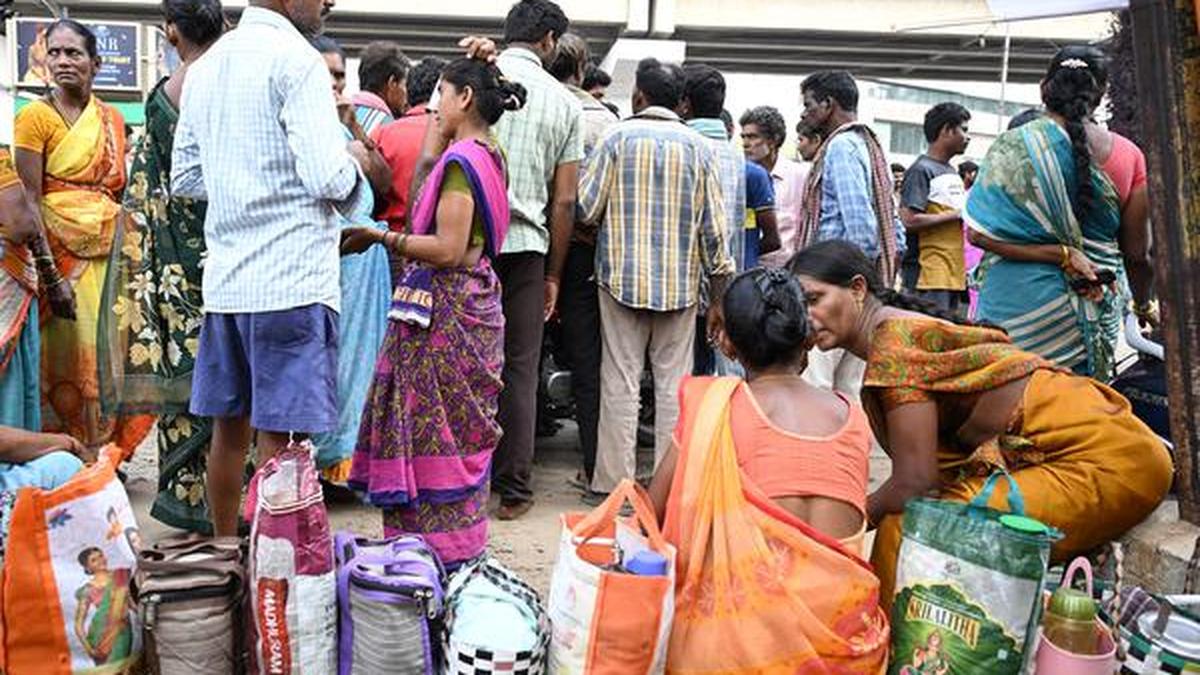
Labourers in the lurch Premium
The Hindu
Labourers in Vijayawada struggle with dwindling work opportunities due to government policies, impacting families and livelihoods.
On a Friday morning, with the mercury soaring to 42 degrees Celsius, Balu, 35, seated on a bench under an awning of a tea stall with a newspaper in hand, is fidgety. His furrowed brow and slumped shoulders show his anxiety. He, like most other labourers gathered at Benz Circle in Vijayawada, Andhra Pradesh, await a work call from their contractors. It is 10.30 a.m., and Balu’s hope for a day’s labour and wages to support his family in Madhura Nagar in the city, are dwindling. Yet, he stays put at the centre, the busiest place in the city, where the two main National Highways — NH-65 and NH-16 — intersect.
There are around 30 such labour ‘addas’ (hubs) in Vijayawada, where daily wage earners flock from nearby and distant areas in the early hours, in the hope of securing work. Benz Circle, where around 700 labourers converge every day, is the biggest adda in the city. Their collective aspiration is not to return home empty-handed. However, some of these labourers inevitably find themselves without work. They linger until noon, taking shelter near shops, on the roadside, or under the flyover, while some patiently stay on their feet.
Their work, which varies daily, primarily revolves around construction and related industries. From loading and unloading to tinkering, wall painting, water tank cleaning, drainage, and road construction, their responsibilities span a spectrum. In the past five years, however, the going has been tough, they say. Most of them have often had to go without work, and hence wages, for up to a week at a stretch.
“This has been our everyday situation for the past five years,” Balu says, wiping off the sweat beads on his forehead with a red towel wrapped around his neck. “So much has changed in all these years. Until the COVID-19 pandemic broke out, things were fine. But it is post pandemic that the situation got worse. There is no work for us. Even when we are approached by owners or contractors, we are offered ₹600 or ₹700 a day. My income per month does not exceed ₹10,000. How can that be enough to run a household of four, especially when prices of oil, rice, and all other essentials have risen,” asks Balu. His wife earns ₹7,000 working as a domestic help in the city. “The house rent itself is ₹7,000 here,” he adds.
The last time he got work was three days ago. He received ₹1,000 for construction-related work at a hospital from 12 noon to 5.30 p.m.
Impact of sand policy
B. Nagamani (38), another labourer who has also not had any work in the past three days, points out that things took a turn for the worse after the new government took office in 2019. Her sentiment is echoed by a chorus of voices. The government’s announcement of three capitals put a stop to construction projects in Amaravati, the previous government’s chosen capital near Vijayawada.

 Run 3 Space | Play Space Running Game
Run 3 Space | Play Space Running Game Traffic Jam 3D | Online Racing Game
Traffic Jam 3D | Online Racing Game Duck Hunt | Play Old Classic Game
Duck Hunt | Play Old Classic Game











